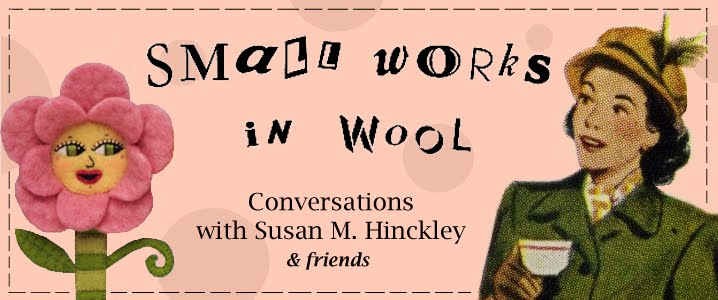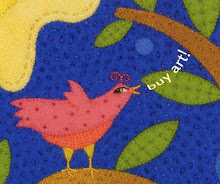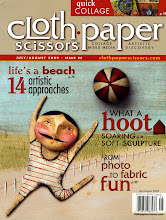You may or may not know -- or care -- that I'm actually a frustrated writer stitching out my aggression in wool "stories", but the fact is I have an endless fascination with all things WORDS. My specific passion is saying things in the most concise way possible.
I guess that's why I'm eternally drawn to poetry: the weight of every word.
Each must earn its keep, not just in meaning but in shape and in sound. Poetry is the ultimate word game, and a great poem is truly rare but when you find one, you know it.
That's why my ears perked up when I turned on NPR for a moment in the car the other day and heard a discussion (I do not know with whom, unfortunately) about What Makes a Great First Line.
My father has long had the habit of jotting down first lines: on restaurant napkins and placemats, on scratch paper, on grocery lists -- and he usually has at least one on his person any time of the day or night. (I've often hoped he'd go beyond the first line, but his first lines are so good, they'd make a fine read all by themselves.)
What the two guests on NPR said that excited me were:
1) guest one: "The first sentence must know about all the other sentences that come after it."
Brilliant. No wonder I had to run into the house to write that down IMMEDIATELY upon returning home, right? And:
2) guest two: "The first sentence leans forward. The first sentence leans into the story."
I love smart people. I'd like to have lunch with one or two of them every day for the rest of my life. And this particular smart discussion went so well with the newspaper article I'd torn out the night before that was still sitting on my kitchen counter, it was pure serendipity.
The headline said,
"Wanted: Six-Word Stories, With Art."
It told about a St. Paul ad copywriter and a Minneapolis graphic designer who gave themselves a 365 challenge in 2010 that was unbelievably difficult but intriguing: One would write a six word story and the other would design/illustrate it every day in 2010. They nicknamed it "The Hemingway Challenge."
The legend goes like this: Ernest Hemingway once boasted that he could write a complete story in just six words. His finished masterpiece tells us that he was right . . .
For sale: baby shoes, never worn.
Took my breath away. There's a reason he's Hemingway, and if you ever doubted it, you've just seen proof. Talk about one line knowing about every other line that would come after it. Only in this case, it kept the knowledge to itself (even though it was fairly bursting with it).
Someone at a show once told me that my pieces reminded him of "twelve word stories". . . I thought a twelve word story was impressive, until I met a few six word stories.
A few more from the article I loved:
Holes in her story and pantyhose.
He was allergic, the cat stayed.
-- and --
His mom dutifully shaved his back.
Now the duo has opened up their challenge to the world with a new goal: they will post a new contributed story on www.sixwordstoryeveryday.com each day in 2011 (the complete 2010 collection is there to view, as well).
Any writer/designer act can contribute!
Are you thinking yet?
You should be.
You should be.
(Wait a minute . . . was that?! Rats. That was seven words . . .)




















2 comments:
I just gave the Six-Word Memoir assignment to my Freshman Comp students yesterday. I should get 54 stories tomorrow. I can't wait! Sometimes we think we need a lot of words to say something; this is an excellent exercise to teach the power of just a few words.
I've always been drawn to words too, did a stint writing poetry, and wanted to be a journalist - to get the story in as few words as possible. Then, I discovered images, and my goal became to tell a story in pictures. Does that mean I regressed?
This is what I love about your art Susan, your pictures and few words tell the complete story, and it captivates.
I love smart people too, that's why I love your blog. I can't wait to see what you come up with for the challenge!
Post a Comment